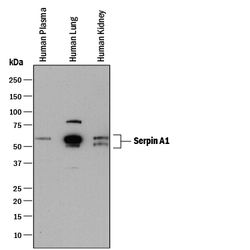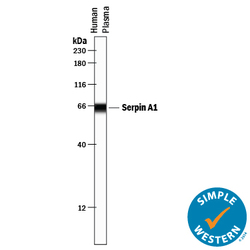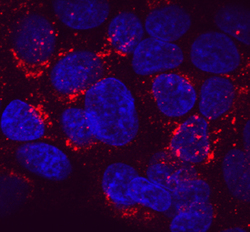MAB1268-100
antibody from R&D Systems
Targeting: SERPINA1
A1A, A1AT, AAT, alpha-1-antitrypsin, alpha1AT, PI, PI1
Antibody data
- Antibody Data
- Antigen structure
- References [2]
- Comments [0]
- Validations
- Western blot [2]
- Immunocytochemistry [1]
Submit
Validation data
Reference
Comment
Report error
- Product number
- MAB1268-100 - Provider product page

- Provider
- R&D Systems
- Product name
- Human Serpin A1/alpha 1-Antitrypsin Antibody
- Antibody type
- Monoclonal
- Description
- Protein A or G purified from hybridoma culture supernatant. Detects human Serpin A1/alpha 1-Antitrypsin in direct ELISAs and Western blots. In Western blots, no cross-reactivity with recombinant human Serpin A3, A4, A5, C1, F1, recombinant mouse Serpin D1, or F2 is observed.
- Reactivity
- Human
- Host
- Mouse
- Conjugate
- Unconjugated
- Antigen sequence
P01009- Isotype
- IgG
- Antibody clone number
- 202808
- Vial size
- 100 ug
- Concentration
- LYOPH
- Storage
- Use a manual defrost freezer and avoid repeated freeze-thaw cycles. 12 months from date of receipt, -20 to -70 °C as supplied. 1 month, 2 to 8 °C under sterile conditions after reconstitution. 6 months, -20 to -70 °C under sterile conditions after reconstitution.
Submitted references Modified serpinA1 as risk marker for Parkinson's disease dementia: Analysis of baseline data.
Maggot chymotrypsin I from Lucilia sericata is resistant to endogenous wound protease inhibitors.
Halbgebauer S, Nagl M, Klafki H, Haußmann U, Steinacker P, Oeckl P, Kassubek J, Pinkhardt E, Ludolph AC, Soininen H, Herukka SK, Wiltfang J, Otto M
Scientific reports 2016 May 17;6:26145
Scientific reports 2016 May 17;6:26145
Maggot chymotrypsin I from Lucilia sericata is resistant to endogenous wound protease inhibitors.
Telford G, Brown AP, Kind A, English JS, Pritchard DI
The British journal of dermatology 2011 Jan;164(1):192-6
The British journal of dermatology 2011 Jan;164(1):192-6
No comments: Submit comment
Supportive validation
- Submitted by
- R&D Systems (provider)
- Main image

- Experimental details
- Detection of Human Serpin A1/alpha 1-Antitrypsin by Western Blot. Western blot shows human plasma and lysates of human lung tissue and human kidney tissue. PVDF membrane was probed with 1 µg/mL of Mouse Anti-Human Serpin A1/alpha 1-Antitrypsin Monoclonal Antibody (Catalog # MAB1268) followed by HRP-conjugated Anti-Mouse IgG Secondary Antibody (Catalog # HAF018). Specific bands were detected for Serpin A1/alpha 1-Antitrypsin at approximately 50-60 kDa (as indicated). This experiment was conducted under reducing conditions and using Immunoblot Buffer Group 1.
- Submitted by
- R&D Systems (provider)
- Main image

- Experimental details
- Detection of Human Serpin A1/alpha 1-Antitrypsin by Simple WesternTM. Simple Western lane view shows lysates of human plasma, loaded at 0.2 mg/mL. A specific band was detected for Serpin A1/alpha 1-Antitrypsin at approximately 65 kDa (as indicated) using 10 µg/mL of Mouse Anti-Human Serpin A1/alpha 1-Antitrypsin Monoclonal Antibody (Catalog # MAB1268) . This experiment was conducted under reducing conditions and using the 12-230 kDa separation system.
Supportive validation
- Submitted by
- R&D Systems (provider)
- Main image

- Experimental details
- Serpin A1/alpha 1-Antitrypsin in HepG2 Human Cell Line. Serpin A1/alpha 1-Antitrypsin was detected in immersion fixed HepG2 human hepatocellular carcinoma cell line using Mouse Anti-Human Serpin A1/alpha 1-Antitrypsin Monoclonal Antibody (Catalog # MAB1268) at 10 µg/mL for 3 hours at room temperature. Cells were stained using the NorthernLights™ 557-conjugated Anti-Mouse IgG Secondary Antibody (red; Catalog # NL007) and counter-stained with DAPI (blue). Specific staining was localized to cytoplasm. View our protocol for Fluorescent ICC Staining of Cells on Coverslips.
 Explore
Explore Validate
Validate Learn
Learn Western blot
Western blot Immunoprecipitation
Immunoprecipitation